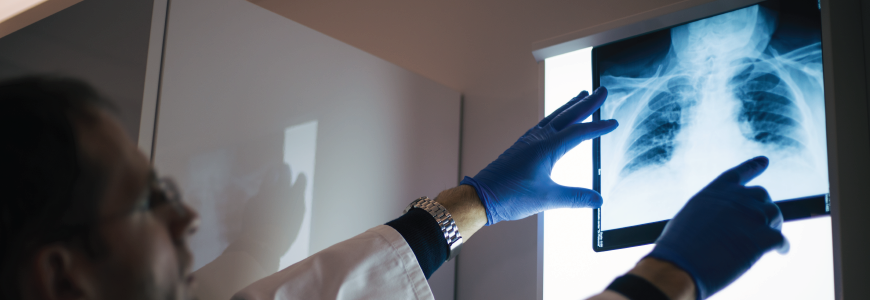Offering convenient, low-dose CT scans and patient-friendly telemedicine consultations by phone or computer, the Duke Lung Cancer Screening Program continues a fast-growth arc that will surpass 3,500 scans during 2023.
But Betty C. Tong, MD, program director and thoracic surgical oncologist, wants the lung screening initiative to reach more patients as part of a broader preventative strategy that includes scans, convenient patient engagement, and prompt, comprehensive follow-up care when necessary.
“Less than 6% of U.S. patients who are eligible have received this simple, low-dose scan,” Tong says, noting that approximately the same proportion of patients treated by Duke Health have been screened. “We need to increase that percentage. We’ve seen consistent increases in screenings, even during COVID-19, but we are working to continue to expand awareness and prevention.”
Duke specialists participated in a national screening trial before becoming one of the first centers in North Carolina to offer low-dose, CT lung scans in 2011. The program began as a part of the thoracic surgery clinic.
“Since the beginning, our program has grown by leaps and bounds,” Tong says. In 2014, the program scanned 28 patients. At the end of 2022, nearly 3,000 patients had participated.
For patient referrals, call the referring provider team Monday through Friday, between 8:00 a.m. and 4:30 p.m. at 919-485-1900 or email OncologyReferral@Duke.edu.
Increasing patient education
The key to expanding preventative care, Tong says, is patient education provided by primary care physicians and pulmonologists, who often refer patients to one of eight Duke sites offering screening across the Triangle.
Tong’s preventive focus is based on two key points: “First, we know that lung screening with low-dose CT will reduce lung cancer mortality,” she says. “Secondly, we know that primary care providers are very busy, and may not have time to address this aspect of their patient’s preventative care. But we have the team and resources to help their patients navigate the cancer screening process,” she adds.
Patients must qualify to be eligible for lung cancer screenings based on several factors, including age and history of smoking. Two members of the lung cancer screening team—Hilary W. Crittenden, MSN, FNP-C and Deborah Semmel, MSN, FNP-C—guide patients through eligibility requirements associated with screening. They evaluate each patient’s eligibility, complete medical decision making for first-time screening for patients, discuss the risks and benefits of the process, provide treatment options for those patients who are still smoking, interpret the CT imaging with the patients, and refer to appropriate providers when necessary.
Between 50 and 60% of CT scans are normal based on the Lung Imaging Reporting and Data System assessment (Lung-RADS) scores, Tong says. If a patient has a finding that is concerning, a second scan is scheduled in three or six months. For a more suspicious finding, the patient is referred to Thoracic surgery or Pulmonology at Duke for specialized imaging such as a PET scan, or even biopsy.
“Patients whose scans are determined to be of high concern have their cases reviewed in our multidisciplinary conference during which medical and surgical specialists determine the most effective treatment plan,” Tong says.
Primary care partnerships
A key aspect of all patient care provided by the lung screening program is the partnership with referring providers. “We work hard to collaborate with the referring physicians and make sure they know about the findings promptly,” says Semmel. “We share our visit notes and other information that may be helpful, and we make sure the providers can contact us directly.”
In some cases, the scans may reveal an important incidental finding. “For example, we occasionally see something on the scan related to the heart that might be appropriate for Cardiology,” Crittenden says. “We make sure that is communicated in the information we share.”
